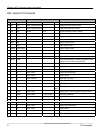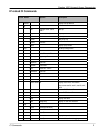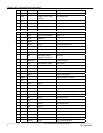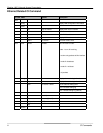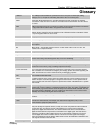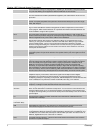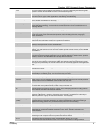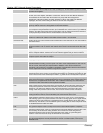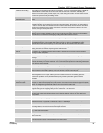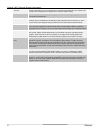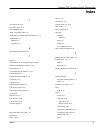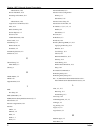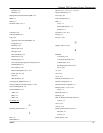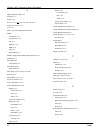
Prestige 1600 Universal Access Concentrator
Glossary
M
RADIUS Accounting This facility logs information about dial-in connections. It can be used independently of RADIUS
Authentication. It allows data to be sent at the start and the end of sessions, indicating the
amount of resources (time, packets, bytes, etc.) used during the session. An ISP could use this
function for special security and billing needs.
RADIUS
Authentication
An external RADIUS server can provide authentication service for an unlimited number of DSL
users.
RFC An RFC (Request for Comments) is an Internet formal document or standard that is the result of
committee drafting and subsequent review by interested parties. Some RFCs are informational
in nature. Of those that are intended to become Internet standards, the final version of the RFC
becomes the standard and no further comments or changes are permitted. Change can occur,
however, through subsequent RFCs.
RIP Routing Information Protocol is an interior or intra-domain routing protocol that uses the
distance-vector routing algorithms. RIP is used on the Internet and is common in the NetWare
environment as a method for exchanging routing information between routers.
RS-232 An EIA standard which is the most common way of linking data devices together.
SDSL Symmetrical Digital Subscriber Line is a symmetrical, bi-directional DSL service that operates on
one twisted-pair wire. It can provide data rates up to the T1 rate of 1.544 Mbits/sec and it
operates above the voice frequency, so voice and data can be carried on the same wire.
Secondary The P1600 secondary provides concentration, network management, Internet access and
routing functions as well but only through the LAN interface.
Server A computer, or a software package that provides a specific kind of service to client software
running on other computers.
SMT The SMT (System Management Terminal) is the interface that you use to configure your
Prestige.
SNMP System Network Management Protocol is a popular management protocol defined by the
Internet community for TCP/IP networks. It is a communication protocol for collecting information
from devices on the network.
Splitter A filter to separate ADSL signals from POTS signals to prevent mutual interference.
Standalone Standalone SMT configurations are the same as a secondary, but in this configuration mode, it
does not have to work with a primary. You can connect a router to its LAN port.
STP Twisted-pair cable consists of copper-core wires surrounded by an insulator. Two wires are
twisted together to form a pair and the pair form a balanced circuit. The twisting prevents
interference problems. STP (shielded twisted-pair) provides protection against external
crosstalk.
Straight-through
Ethernet Cable
A cable that wires a pin to its equivalent pin. This cable connects two dissimilar devices, for
example, a data terminal equipment (DTE) device and a data communications equipment (DCE)
device. A straight-through Ethernet cable is the most common cable used.
SUA SUA (Single User Account) is a proprietary ZyXEL implementation of a subset of NAT that
supports two types of mapping, Many-to-One and Server - see also NAT.
Subnet Mask A bit mask used to select bits from an Internet address for subnet addressing. The mask is 32
bits long and selects the network portion of the Internet address and one or more bits of the
local portion.
SYSLOG SYSLOG allows you to log significant system information to a remote server.
T1 Twenty-four voice channels packed into a 193 bit frame and transmitted at 1.544 Mbps. The
unframed version, or payload, is 192 bits at a rate of 1.536 Mbps.
TCP Transmission Control Protocol. The major transport protocol in the Internet suite of protocols
providing reliable, connection-oriented full-duplex streams.
TCP/IP Filter Rules TCP/IP filter rules allow you to base the rule on the fields in the IP and the upper layer protocol,
e.g., UDP and TCP headers.
Telco The generic name for telephone companies throughout the world which encompasses RBOCs,
LECs and PTTs.
Telnet The virtual terminal protocol in the Internet suite of protocols. Allows users of one host to log into
a remote host and act as normal terminal users of that host.



